Overview
The article focuses on identifying the standout features and roles of the biggest clinical research organizations (CROs) in the healthcare sector. It highlights that CROs like bioaccess®, Quintiles, and Covance excel due to their specialized services in research design, regulatory compliance, and patient recruitment, which are critical for efficient clinical trials and the development of new therapies, as evidenced by their recent growth and innovative approaches to overcoming industry challenges.
Introduction
In the ever-evolving field of clinical research, Clinical Research Organizations (CROs) have emerged as indispensable allies for pharmaceutical, biotechnology, and medical device companies. These organizations not only streamline the complexities of clinical trials but also enhance the quality and speed of bringing new therapies to market.
As the demand for specialized services grows, CROs like bioaccess® are at the forefront, offering critical expertise in areas such as:
- Patient recruitment
- Regulatory compliance
- Data management
With recent market trends indicating a surge in first-in-class drug launches and significant investments in expanding CRO capabilities, understanding the pivotal roles these organizations play is essential for stakeholders navigating the intricate landscape of clinical research.
This article delves into the multifaceted functions of CROs, the challenges they face, and the innovative solutions they provide, shedding light on their vital contribution to advancing healthcare.
Understanding Clinical Research Organizations (CROs): An Overview
The biggest clinical research organizations (CROs) act as essential collaborators for the pharmaceutical, biotechnology, and medical device sectors, providing crucial assistance in the implementation of clinical studies. Their expertise includes vital areas such as:
- Research design
- Participant recruitment
- Data management
- Navigation of regulatory compliance
These areas are essential for successful outcomes. In particular, bioaccess®, recognized as a leading CRO in Latin America, specializes in advancing medical device trials through comprehensive services that include:
- Feasibility assessments
- Investigator selection
- Regulatory compliance
- Project management
- Detailed reporting on study status, inventory, and adverse events
This is particularly vital for Medtech startups facing challenges such as:
- Regulatory hurdles
- Competition
- Recruitment issues
- Financial constraints
By assigning complex tasks to expert partners like bioaccess®, sponsors can focus on their core competencies, facilitating a more streamlined and efficient approach to research. This strategic outsourcing is becoming more essential as the demand for specialized services in the healthcare sector rises, highlighting the importance of the biggest clinical research organizations in improving both the quality and speed of medical research.
The recent growth in the CRO market, highlighted by the 24 first-in-class launches in the U.S. in 2023, reflects a growing recognition of the biggest clinical research organizations' value in addressing the intricate challenges associated with bringing new therapies to market. Furthermore, Dr. August Troendle, CEO, underscores this growth by noting the commitment to add 1,500 jobs and invest $150 million to expand operations, showcasing the industry’s rapid evolution. The acquisition of Baseline Controls by Precision for Medicine further exemplifies how contract research organizations are enhancing their capabilities to drive greater speed and efficiency in bringing new drugs to market.
To learn more about how bioaccess® can assist your trials, BOOK A MEETING today.
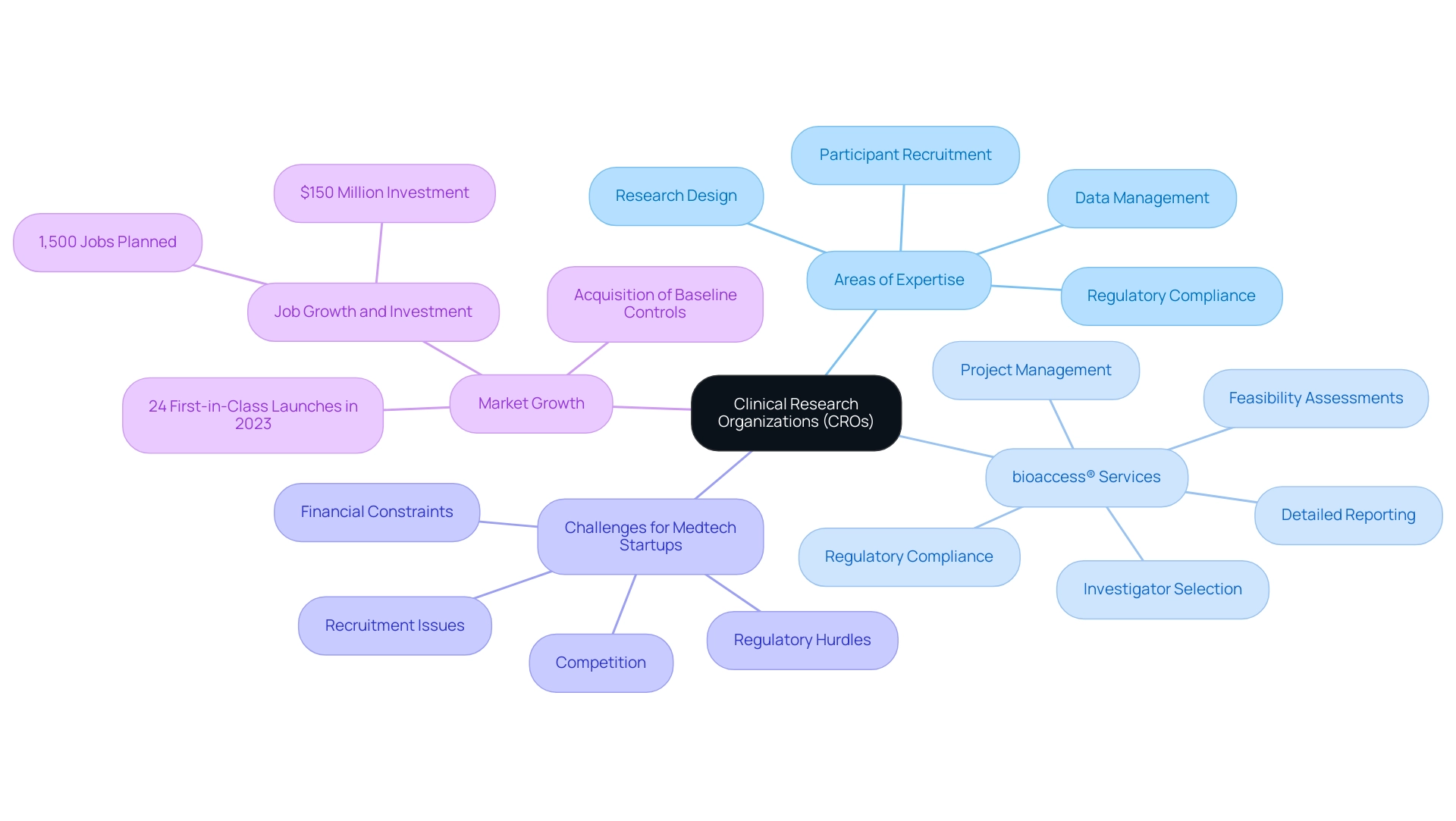
The Essential Roles of CROs in Advancing Clinical Research
The biggest clinical research organizations serve a crucial role in the field of medical research, performing vital tasks such as project management, regulatory compliance, site management, and data analysis. Serving as essential intermediaries between sponsors and research sites, CROs guarantee that studies comply rigorously with regulatory guidelines. Their expertise is particularly crucial in patient recruitment; they leverage extensive networks and specialized knowledge to identify and engage suitable candidates for studies.
A significant partnership between bioaccess™ and Caribbean Health Group seeks to establish Barranquilla as a premier location for medical research in Latin America, greatly backed by Colombia's Minister of Health. This initiative is designed to improve clinical study services in the region, achieving impressive results such as over a 50% reduction in recruitment time and 95% retention rates in recent studies. bioaccess™ provides extensive services such as:
- Feasibility assessments
- Site selection
- Compliance evaluations
- Setup for testing
- Import permits
- Project management
- Reporting
These services are essential for accelerating the development of new therapies while upholding high-quality standards.
With costs for initiating medical studies in 2024 expected to remain stable, embracing strategic vendor-sponsor relationships has become increasingly important for contract research organizations to enhance competitiveness and resilience in the industry. Furthermore, the implementation of innovative patient recruitment strategies has shown promising results, with several of the biggest clinical research organizations reporting improved success rates in enrolling participants, with some achieving rates as high as 80% in recent trials. A notable example is Precision for Medicine's acquisition of Baseline Controls in 2023, which is expected to enhance their biomanufacturing capabilities and drive greater efficiency in bringing new drugs to market.
Additionally, Proclinical's recent job opening for an External Manufacturing Operations Lead in Slough, England, reflects the growing demand for CRO services and the industry's commitment to expansion. Dr. August Troendle, CEO of a leading CRO, has underscored this commitment to growth by announcing plans to create 1,500 new jobs and invest $150 million in expanding their operations, reflecting the organization's dedication to improving patient recruitment and overall research efficacy. Through their comprehensive service offerings, the biggest clinical research organizations not only expedite the development of new therapies but also uphold high-quality standards throughout the research process, contributing positively to local economies through job creation and economic growth.
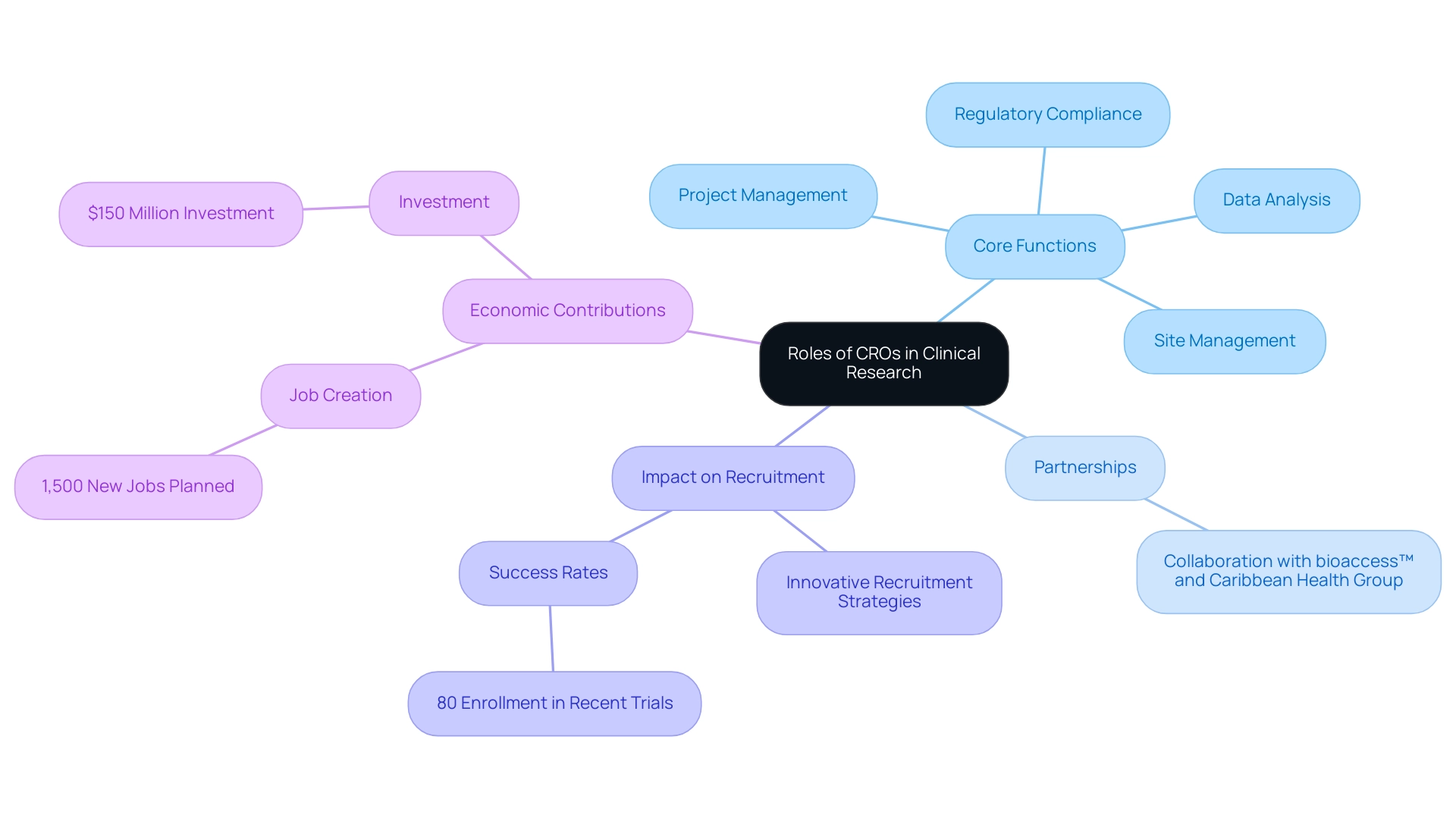
Top Clinical Research Organizations: A Comparative Analysis
In the dynamic landscape of medical research, the biggest clinical research organizations (CROs) distinguish themselves through their significant size, specialized expertise, and comprehensive service offerings. Quintiles, for example, boasts a remarkable global presence with over 3,000 staff across 60 countries, enhancing its ability to manage large-scale trials effectively through services such as:
- Feasibility studies
- Site selection
- Compliance reviews
- Thorough review and feedback on study documents
The organization is especially recognized for its innovative solutions that address various aspects of research in healthcare.
Covance, a subsidiary of LabCorp, stands out for its superior laboratory services and deep-rooted expertise in drug development, consistently ranking among the biggest clinical research organizations in terms of market share. Meanwhile, PPD has earned acclaim for its patient-centric approach, emphasizing adaptive study designs that improve participant engagement and data quality.
Recent developments within the CRO market, such as LEO Pharma's strategic partnership with ICON in March 2023, underscore the ongoing evolution in execution capabilities, enhancing the efficiency and effectiveness of clinical studies in medical dermatology. The service capabilities provided by these organizations encompass:
- Setup and start-up processes
- Import permits for investigational devices
- Project management
- Thorough reporting on project status and adverse events
This holistic approach not only drives global health improvement through international collaboration and innovation in Medtech but also has a significant impact on local economies, fostering job creation and healthcare improvements.
Additionally, notable case studies highlight the competitive advantages these organizations possess.
Debashree Bora emphasizes the growing incorporation of mobile technology in studies, stating, "For example, Pfizer's fully virtual study for Atopic Dermatitis used mobile technology to enable remote patient monitoring and virtual consultations, aligning with the DCT approach to improve accessibility and efficiency." This trend is one that all the biggest clinical research organizations are eager to embrace, highlighting their dedication to innovation.
By analyzing the strengths of Quintiles, Covance, and PPD, stakeholders can better align their research goals with the capabilities of these leading entities, ensuring a more informed decision in their partnerships. Notably, the interventional segment continues to dominate the CRO market, reflecting the ongoing demand for robust and effective research solutions.
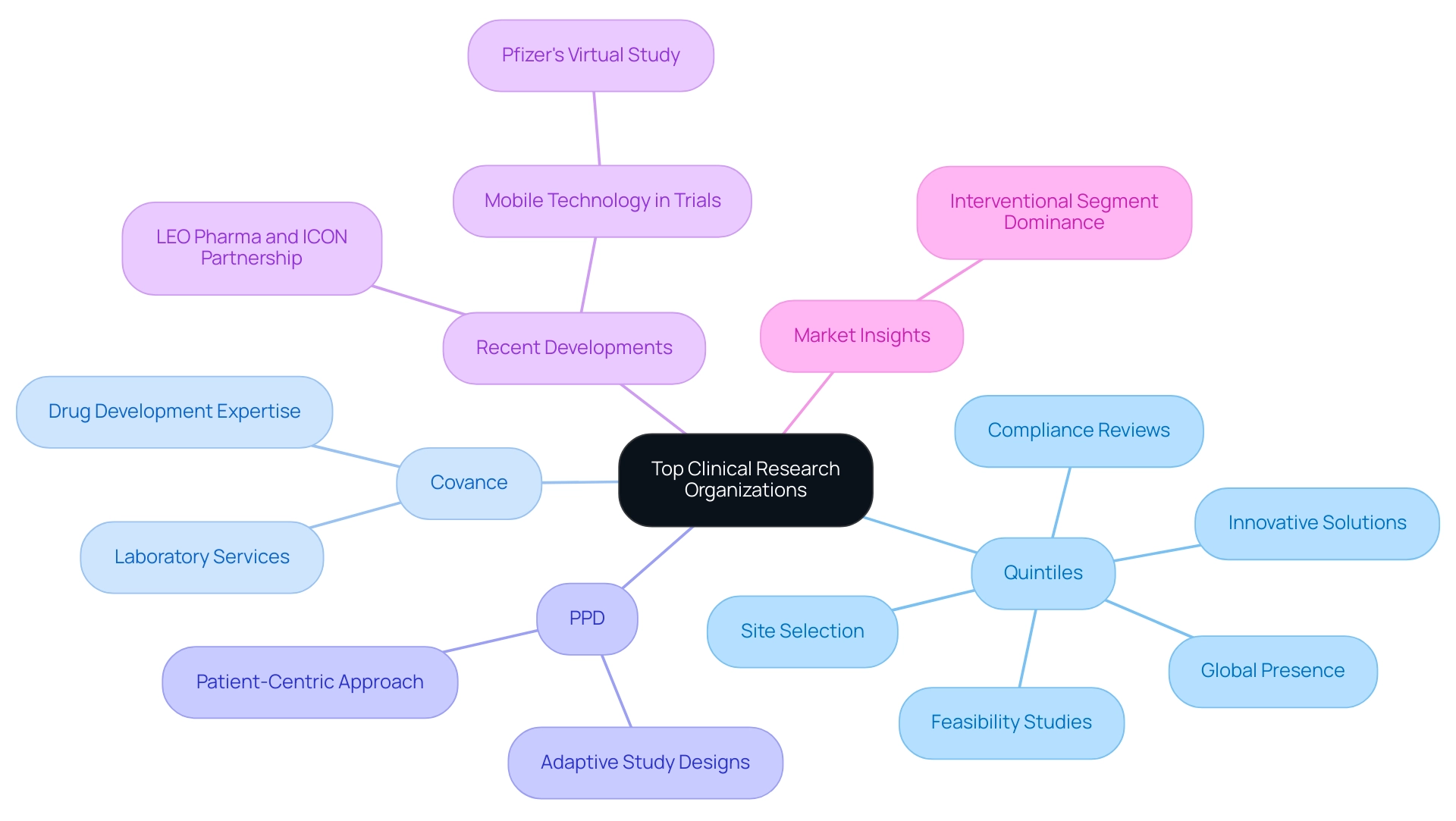
Key Services Offered by Leading CROs: What Sets Them Apart
The biggest clinical research organizations (CROs) are crucial in meeting the varied needs of contemporary studies. They offer an extensive range of services, including:
- Feasibility studies
- Site selection
- Compliance assessments that guarantee conformity to regulatory standards
- Setup for investigations
- Import permits for research devices
- Nationalization procedures
- Project management
- Thorough reporting on study status, inventory, and both serious and non-serious adverse events
All essential for facilitating medical device research. Notably, approximately 70% of primary interviews were conducted with supply-side representatives, underscoring the importance of understanding sponsor needs in the CRO landscape.
In 2024, the landscape of CRO services is characterized by a strong emphasis on tailored solutions, with many organizations specializing in niche areas such as rare disease research or specific therapeutic domains. This differentiation is crucial in a competitive market where the biggest clinical research organizations must be adaptable to sponsor needs. For example, bioaccess® distinguishes itself as a prominent CRO supporting medical device studies in Latin America, emphasizing innovation and regulatory excellence.
The recent collaboration between Avance Clinical and Right aims to integrate novel GenAI technologies into research networks, enhancing cooperation and operational efficiency within studies. Additionally, the integration of advanced analytics and real-world evidence services empowers sponsors to enhance their decision-making capabilities. As highlighted by Andrew MacGarvey, CEO of Phastar, 'Increasingly, our customers and potential clients are approaching us with innovative demands, such as incorporating synthetic data into their upcoming studies.'
Such innovations reflect a significant trend in trial management, underscoring the necessity for the biggest clinical research organizations to remain agile and responsive to the evolving landscape of research.
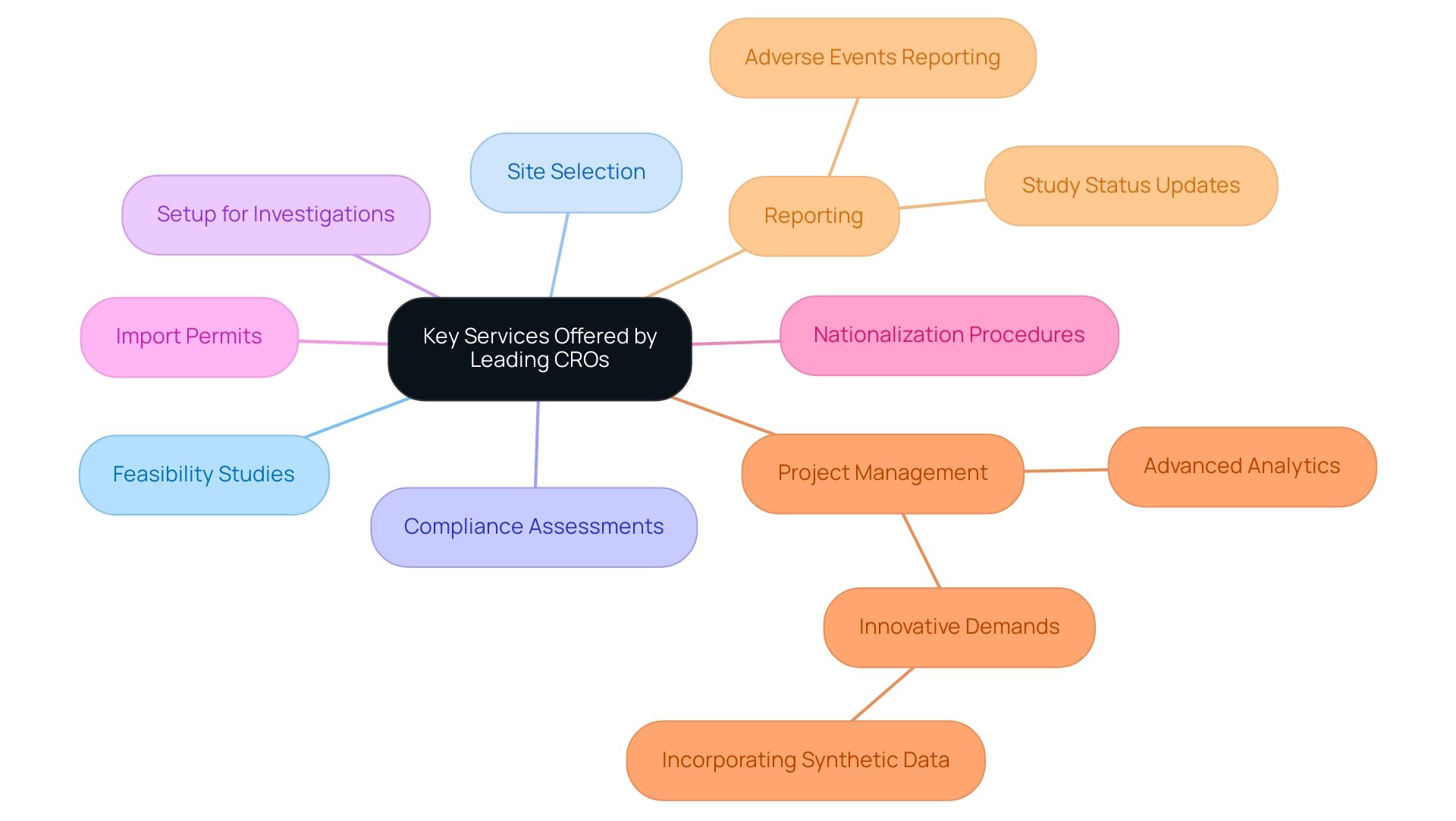
Challenges in Clinical Research: Recruitment, Compliance, and Project Management
In 2024, the biggest clinical research organizations are navigating a challenging landscape, particularly concerning patient recruitment and regulatory compliance. Finding eligible participants remains a significant hurdle, yet innovative referral strategies can greatly enhance recruitment efficiency. A notable case involved prescreening 37 individuals, resulting in a 100% completion rate among those recruited through personal invitations from satisfied participants, highlighting the importance of participant experience.
Moreover, the biggest clinical research organizations must stay vigilant in compliance with ever-evolving regulations, as emphasized by Anthony Haywood, Vice President of Clinical Trials Optimization at MEDiSTRAVA, who notes that challenges persist despite advancements. Effective project management becomes crucial as organizations like bioaccess® utilize their extensive capabilities—including:
- Feasibility studies
- Site selection
- Compliance reviews
- Setup
- Import permits
- Project management
- Reporting
to navigate these complex challenges. Additionally, clients with queries or concerns about data protection can reach out to our Grievance Officer at bioaccess®, ensuring that we address their concerns in accordance with applicable law.
By doing so, they ensure that research studies advance smoothly and efficiently, meeting the expectations of stakeholders while adhering to necessary compliance standards.
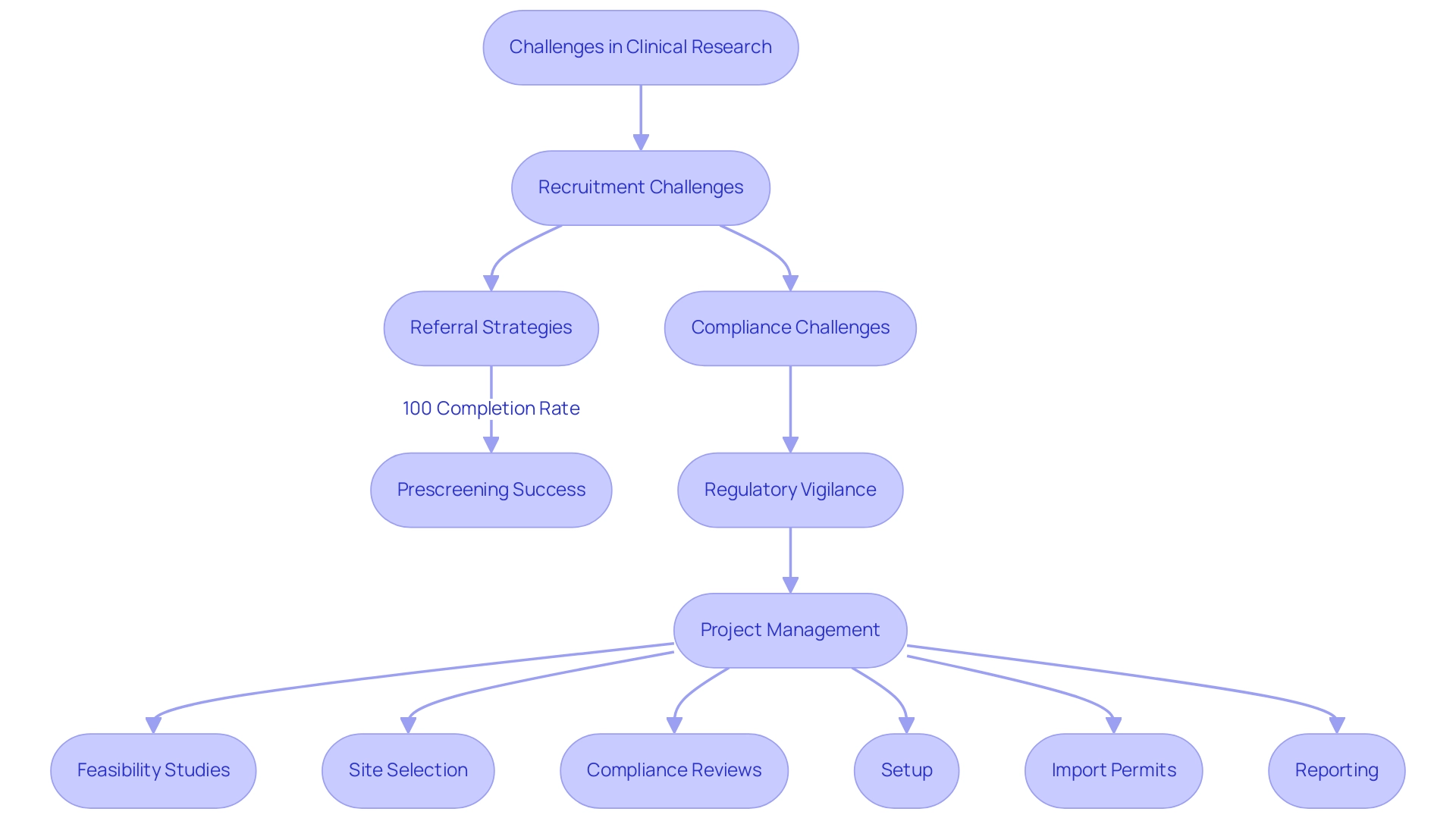
The Role of Innovation and Technology in Modern CROs
Innovation and technology are fundamentally reshaping the operations of the biggest clinical research organizations (CROs), particularly in the context of Latin America’s unique challenges. Advanced tools such as electronic data capture systems and sophisticated analytics platforms have significantly enhanced both the efficiency and accuracy of clinical studies. For example, the adoption of telemedicine has expanded patient access to studies, facilitating greater enrollment diversity and convenience.
As Khalid Saleh, CEO of Invesp, notes, 'Personalized approaches in patient recruitment can enhance participation rates, much like personalized landing pages increase conversions in digital marketing.' Moreover, predictive analytics enables CROs to enhance patient recruitment strategies, ensuring a more effective testing process.
In reaction to the intricate challenges that US Medtech firms encounter in Latin America—such as regulatory obstacles, language barriers, and the necessity for smooth cooperation—comprehensive research management services are essential. These services encompass:
- Feasibility assessments
- Site selection
- Compliance reviews
- Trial setup
- Import permits
- Project management
- Reporting
Emerging technologies such as blockchain are also being explored for their potential to improve data integrity and security, addressing critical issues in research.
A recent study found that organizations leveraging AI-driven tools saw a 30% reduction in operational costs, particularly through improved efficiencies in project management and compliance reviews. As the biggest clinical research organizations increasingly incorporate these advancements, they position themselves to navigate the complexities of the evolving clinical research landscape more adeptly, ultimately leading to improved outcomes and expedited timelines.
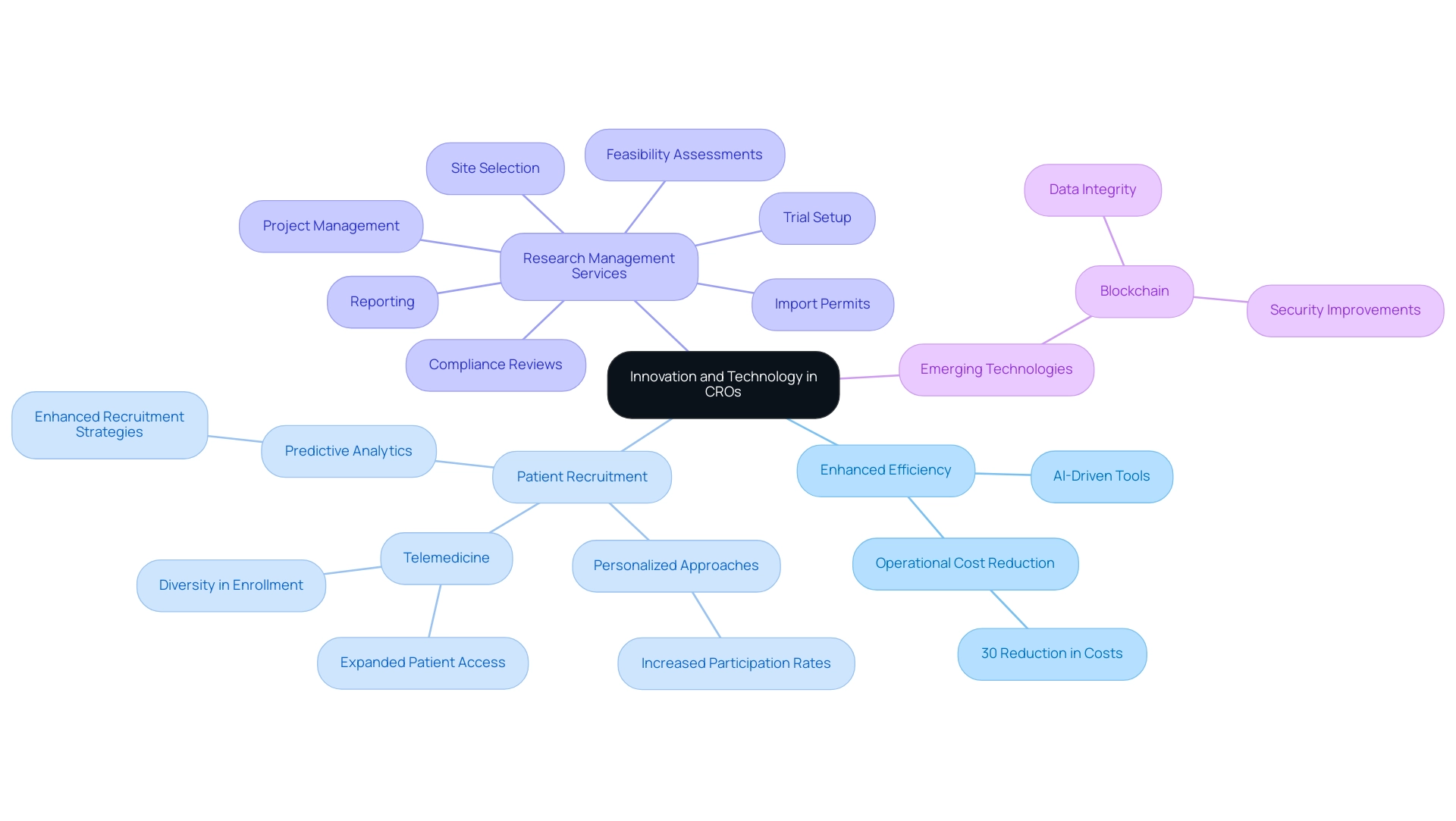
Conclusion
The significance of Clinical Research Organizations (CROs) in modern clinical research cannot be overstated. These organizations serve as essential partners for pharmaceutical, biotechnology, and medical device companies, offering expertise in critical areas such as patient recruitment, regulatory compliance, and data management. By streamlining complex processes and enhancing the quality and speed of clinical trials, CROs like bioaccess® are pivotal in bringing innovative therapies to market.
As the industry faces challenges like patient recruitment and compliance with evolving regulations, CROs have shown remarkable adaptability. Strategies such as innovative patient recruitment techniques and the integration of technology, including telemedicine and advanced analytics, have proven effective in overcoming these hurdles. Furthermore, recent market dynamics, including significant investments and acquisitions, highlight the growing demand for specialized services that CROs provide.
In conclusion, the evolving landscape of clinical research is increasingly reliant on the capabilities of CROs. Their comprehensive service offerings not only facilitate the efficient execution of clinical trials but also contribute positively to local economies through job creation. As stakeholders navigate the complexities of bringing new therapies to market, the role of CROs as strategic partners will only continue to grow, underscoring their vital contribution to advancing healthcare and improving patient outcomes.
Frequently Asked Questions
What role do clinical research organizations (CROs) play in medical research?
CROs act as essential collaborators for the pharmaceutical, biotechnology, and medical device sectors, providing support in implementing clinical studies through expertise in research design, participant recruitment, data management, and regulatory compliance.
What specific services does bioaccess® offer as a leading CRO?
Bioaccess® specializes in advancing medical device trials and offers services such as feasibility assessments, investigator selection, regulatory compliance, project management, and detailed reporting on study status, inventory, and adverse events.
What challenges do Medtech startups face that CROs can help address?
Medtech startups often encounter regulatory hurdles, competition, recruitment issues, and financial constraints, which CROs can help navigate by managing complex tasks, allowing startups to focus on their core competencies.
How has the CRO market been evolving recently?
The CRO market has seen significant growth, highlighted by 24 first-in-class launches in the U.S. in 2023. This growth reflects the increasing recognition of CROs' value in overcoming challenges related to bringing new therapies to market.
What recent developments showcase the growth and expansion of CROs?
Dr. August Troendle, CEO of a leading CRO, announced plans to create 1,500 new jobs and invest $150 million to expand operations. Additionally, the acquisition of Baseline Controls by Precision for Medicine illustrates efforts to enhance capabilities for faster drug development.
How do CROs improve patient recruitment for clinical studies?
CROs leverage extensive networks and specialized knowledge to identify and engage suitable candidates for studies, resulting in improved success rates in participant enrollment, with some organizations achieving rates as high as 80%.
What partnership is bioaccess™ involved in to enhance medical research in Latin America?
Bioaccess™ has partnered with Caribbean Health Group to establish Barranquilla as a premier location for medical research in Latin America, which has led to significant improvements in clinical study services, including a 50% reduction in recruitment time and high retention rates.
What is the importance of strategic vendor-sponsor relationships in the CRO industry?
Embracing strategic vendor-sponsor relationships is increasingly important for CROs to enhance competitiveness and resilience in the industry, especially as costs for initiating medical studies are expected to remain stable.

